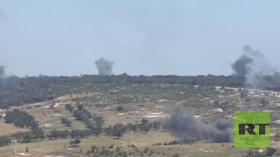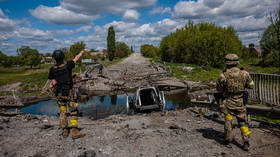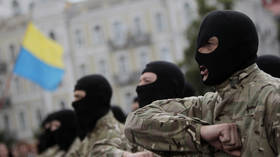WATCH: Russian forces repel neo-Nazi attack in Donbass

As Ukrainian forces recently attempted to assault the town of Belogorovka in the Lugansk People’s Republic, RT had a crew nearby.
TV Correspondent Murad Gazdiev reported, from the scene, that the attack, led by the infamous ‘Kraken’ neo-Nazi battalion, was met with a “hail of artillery fire."
The offensive was successfully defeated following close-quarter combat on the outskirts of the settlement. Russian troops captured four Kraken fighters. One of them, identified only as Dmitry, told RT that morale in the nationalist unit was extremely low and the commanders treated soldiers like “earthworms” by simply “crushing them underfoot” and forcing them to launch assaults.
The battalion has been stationed in the north-eastern Ukrainian city for months, Dmitry said.
Dmitry himself was left behind by his fellow fighters during the hasty and chaotic retreat of the ‘Kraken’ battalion from Belogorovka. The man claimed he was part of a Ukrainian Kharkov “territorial defense” unit until it was “merged” with Kraken.
According to him, the Kraken had to frequently change their base locations in the city since the locals have been exposing it and making it public on social media. Kharkov has been traditionally seen as a city with a rather strong pro-Russian sentiment.
Delete
According to Dmitry, the nationalists had to frequently change their base locations in the city since locals were exposing it and publishing it on social media.
Eventually, the battalion was sent to frontlines not far from Belogorovka, some 200 kilometers away from Kharkov.
That happened, the captive alleged, soon after bodies were found in a battalion member's backyard. The seven bodies discovered in the yard allegedly belonged to civilians killed by a ‘Kraken’ member, Dmitry said.
The captive did not elaborate on whether any punitive measures had been taken against the suspected killer. The man called the neo-Nazis “savages” and said he would not “go back” even if Ukrainian forces offered to exchange him for Russian captives.
In late June, the Russian Defense Ministry claimed that its forces had killed over one hundred Kraken battalion fighters in a series of precision artillery strikes against targets near Kharkov. Moscow considers the battalion an offshoot of the notorious neo-Nazi Azov regiment, which saw a large amount of its fighters surrender in the city of Mariupol in the spring.
A video that circulated online showed the neo-Nazis shooting POWs in the knees and killing them.
Kraken calls itself a special reconnaissance and sabotage unit under the Ministry of Defense, operating separately from the Armed Forces of Ukraine. Moscow has accused the battalion of committing several war crimes since the beginning of the conflict, including the mistreatment of Russian prisoners of war. A video that circulated on the internet showed the neo-Nazis shooting the POWs in the knees and killing them.
The head of Russia’s National Defense Control Center, Mikhail Mizintsev, has also previously accused Kraken members of harassing Kharkov region residents and of conducting “punitive raids” against people suspected of harboring pro-Russian sentiments.














